The United Kingdom, with its rich history and vibrant culture, has given the world a treasure trove of unique terms and concepts. From the hallowed halls of Parliament to the cozy corners of local pubs, British civilisation is peppered with fascinating terminology that reflects its complex social, political, and cultural landscape. In this comprehensive guide, we’ll explore 50 of the most common British civilisation terms, providing clear definitions, phonetic transcriptions, and practical examples for each.
Whether you’re a student of history, an anglophile, or simply curious about British culture, understanding these terms is key to grasping the essence of life in the UK.
50 Most Common British Civilisation Terms Explained with Examples
By familiarizing yourself with these concepts, you’ll gain a deeper appreciation for British society and be better equipped to navigate conversations about UK culture, politics, and traditions.
So, grab a cup of tea, make yourself comfortable, and let’s embark on a linguistic journey through the heart of British civilisation!
#1. 🏛️ Parliament /ˈpɑːləmənt/
Definition: The supreme legislative body of the United Kingdom, consisting of the Sovereign, the House of Lords, and the House of Commons.
Examples:
- The Prime Minister addressed Parliament on the urgent matter of climate change.
- New laws must be approved by both Houses of Parliament before receiving Royal Assent.
#2. 👑 Monarchy /ˈmɒnəki/
Definition: The system of government in which a country is ruled by a monarch, typically a king or queen.
Examples:
- The British monarchy has been a constitutional monarchy since the 17th century.
- Many tourists visit London hoping to catch a glimpse of members of the royal family.
#3. 🗳️ General Election /ˈdʒenərəl ɪˈlekʃən/
Definition: A nationwide election in which all eligible voters can participate to choose members of Parliament.
Examples:
- The most recent UK general election was held in December 2019.
- During a general election campaign, political parties release manifestos outlining their policies.
#4. 🏴 Home Counties /həʊm ˈkaʊntiz/
Definition: The counties surrounding London, typically including Berkshire, Buckinghamshire, Essex, Hertfordshire, Kent, Surrey, and Sussex.
Examples:
- Many commuters live in the Home Counties and work in London.
- The Home Counties are known for their picturesque villages and countryside.
#5. 🍻 Pub /pʌb/
Definition: Short for “public house,” a licensed establishment serving alcoholic drinks and often food.
Examples:
- After work, colleagues often meet at the local pub for a pint.
- Traditional British pubs often have names like “The Red Lion” or “The Crown.”
#6. 🚇 The Tube /ðə tjuːb/
Definition: The colloquial name for London’s underground railway system, officially called the London Underground.
Examples:
- Millions of Londoners use the Tube to commute to work every day.
- The iconic Tube map was designed by Harry Beck in 1931.
#7. 🎓 Oxbridge /ˈɒksbridʒ/
Definition: A portmanteau referring collectively to the Universities of Oxford and Cambridge.
Examples:
- Many British Prime Ministers have been Oxbridge graduates.
- Securing a place at an Oxbridge college is highly competitive.
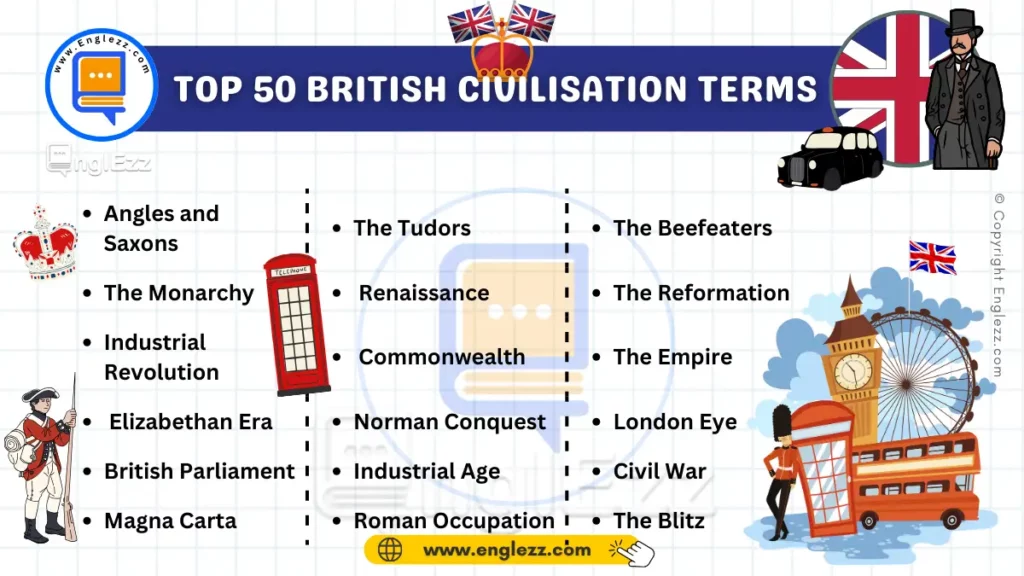
#8. 🏰 Stately Home /ˈsteɪtli həʊm/
Definition: A large, impressive country house, typically owned by aristocracy or landed gentry.
Examples:
- Chatsworth House in Derbyshire is one of Britain’s most famous stately homes.
- Many stately homes are now open to the public and managed by organizations like the National Trust.
#9. 🍵 Afternoon Tea /ˌɑːftəˈnuːn tiː/
Definition: A light meal typically eaten between 3:30 and 5:00 PM, consisting of tea, sandwiches, scones, and cakes.
Examples:
- The Ritz in London is famous for its luxurious afternoon tea service.
- Hosting an afternoon tea party is a popular way to celebrate special occasions.
#10. 👨⚖️ Common Law /ˈkɒmən lɔː/
Definition: The body of law derived from judicial decisions, rather than from statutes or constitutions.
Examples:
- The principle of “innocent until proven guilty” is a fundamental aspect of common law.
- Many former British colonies, including the United States, have legal systems based on English common law.
#11. 🎭 West End /west end/
Definition: The entertainment district in central London known for its prestigious theatres and shows.
Examples:
- The Phantom of the Opera” has been running in the West End for over 30 years.
- Many aspiring actors dream of performing on a West End stage.
#12. 📰 Fleet Street /fliːt striːt/
Definition: A street in London historically associated with the British newspaper industry.
Examples:
- Although most newspapers have moved their offices, “Fleet Street” is still used as a metonym for the British press.
- The last major news organization left Fleet Street in 2016, marking the end of an era.
#13. 🏛️ Westminster /ˈwestmɪnstə/
Definition: The area of central London where the Houses of Parliament and many government offices are located.
Examples:
- The phrase “Westminster bubble” refers to the perceived disconnect between politicians and the general public.
- Big Ben, part of the Palace of Westminster, is one of London’s most recognizable landmarks.
#14. 👑 Royal Warrant /ˈrɔɪəl ˈwɒrənt/
Definition: A mark of recognition given to people or companies who supply goods or services to the royal household.
Examples:
- Twinings tea has held a Royal Warrant since 1837.
- Products with a Royal Warrant often display the royal coat of arms on their packaging.
#15. 🏛️ House of Lords /haʊs əv lɔːdz/
Definition: The upper house of the UK Parliament, consisting of appointed members and some hereditary peers.
Examples:
- The House of Lords plays a crucial role in scrutinizing and revising legislation.
- Recent reforms have reduced the number of hereditary peers in the House of Lords.
#16. 🗳️ Constituency /kənˈstɪtjuənsi/
Definition: A geographical area represented by a Member of Parliament in the House of Commons.
Examples:
- The UK is divided into 650 parliamentary constituencies.
- MPs often hold regular surgeries to meet with constituents and address their concerns.
#17. 🏛️ Hansard /ˈhænsɑːd/
Definition: The official report of all parliamentary debates in the UK.
Examples:
- Researchers often use Hansard to study the development of legislation and political debates.
- Hansard is named after Thomas Curson Hansard, who began printing the reports in the early 19th century.
#18. 🎨 National Trust /ˈnæʃənl trʌst/
Definition: A charity that preserves and protects historic places and spaces across England, Wales, and Northern Ireland.
Examples:
- The National Trust manages over 500 historic houses, castles, and gardens.
- Many Britons are members of the National Trust, which allows them free entry to properties.
#19. 🚉 British Rail /ˈbrɪtɪʃ reɪl/
Definition: The former state-owned railway company that operated most of the rail transport in Great Britain from 1948 to 1997.
Examples:
- The privatization of British Rail in the 1990s led to the creation of numerous private train operating companies.
- The British Rail logo, known as the “double arrow,” is still used as a general symbol for railways in the UK.
#20. 🍺 Real Ale /rɪəl eɪl/
Definition: A type of beer brewed from traditional ingredients and left to mature in the cask from which it is served.
Examples:
- The Campaign for Real Ale (CAMRA) has been instrumental in preserving traditional British brewing methods.
- Many pubs host real ale festivals to showcase local and regional brews.
#21. 📚 Oxbridge /ˈɒksbridʒ/
Definition: A portmanteau referring collectively to the Universities of Oxford and Cambridge.
Examples:
- Many British Prime Ministers have been Oxbridge graduates.
- The Oxbridge interview process is known for its challenging and unconventional questions.
#22. 🏰 Listed Building /ˈlɪstɪd ˈbɪldɪŋ/
Definition: A structure of special architectural or historic interest that is protected from unauthorized alteration or demolition.
Examples:
- The Tower of London is a Grade I listed building, the highest level of protection.
- Owners of listed buildings must obtain consent before making any significant changes to the property.
#23. 🌳 Green Belt /griːn belt/
Definition: An area of land around a city where building is restricted to prevent urban sprawl.
Examples:
- London’s Green Belt was established in the 1930s to prevent the city from expanding unchecked.
- The preservation of Green Belt land is often a contentious issue in UK urban planning debates.
#24. 🚌 Double-decker Bus /ˈdʌbl ˈdekə bʌs/
Definition: A bus with two levels of passenger accommodation, common in UK cities.
Examples:
- The red double-decker bus is an iconic symbol of London.
- Many tourists enjoy sightseeing tours on open-top double-decker buses.
#25. 🏛️ City of London /ˈsɪti əv ˈlʌndən/
Definition: The historic financial district of London, also known as “The Square Mile.”
Examples:
- The City of London has its own police force, separate from the Metropolitan Police.
- Despite its name, the City of London is only a small part of Greater London.
#26. 🎓 Sixth Form /sɪksθ fɔːm/
Definition: The final two years of secondary education in England, Wales, and Northern Ireland, typically for students aged 16-18.
Examples:
- Many students take A-level exams during their time in Sixth Form.
- Some schools have dedicated Sixth Form colleges separate from the main school buildings.
#27. 🏠 Council House /ˈkaʊnsl haʊs/
Definition: A form of public housing built and managed by local authorities.
Examples:
- The “Right to Buy” scheme introduced in the 1980s allowed many council house tenants to purchase their homes.
- Council houses were built in large numbers after World War II to address housing shortages.
#28. 🚶♂️ Pedestrianised /pɪˈdestriənaɪzd/
Definition: An area where vehicle traffic is prohibited, reserved for pedestrian use only.
Examples:
- Many city centers have pedestrianised shopping areas to create a safer, more pleasant environment for shoppers.
- The pedestrianisation of Trafalgar Square in London has made it a more popular public space.
#29. 🍻 Last Orders /lɑːst ˈɔːdəz/
Definition: The final opportunity to purchase drinks before a pub closes for the night.
Examples:
- Traditionally, last orders are announced by ringing a bell at the bar.
- The phrase “Time, gentlemen, please” was often used to indicate last orders.
#30. 🎭 Pantomime /ˈpæntəmaɪm/
Definition: A type of musical comedy stage production, typically performed around Christmas, based on fairy tales and featuring audience participation.
Examples:
- Many famous actors got their start performing in local pantomimes.
- Traditional pantomime roles include the Dame (a man dressed as a woman) and the Principal Boy (often played by a woman).
#31. 🏛️ Quango /ˈkwæŋɡəʊ/
Definition: Quasi-Autonomous Non-Governmental Organisation – a body that is funded by the government but operates independently of it.
Examples:
- The British Broadcasting Corporation (BBC) is often described as a quango.
- The number and role of quangos in UK governance is a frequent topic of political debate.
#32. 🚗 MOT /ˌem əʊ ˈtiː/
Definition: Ministry of Transport test – an annual test of vehicle safety, roadworthiness, and exhaust emissions required for most vehicles in the UK.
Examples:
- Driving a car without a valid MOT certificate can result in a fine and penalty points on your license.
- Many garages offer MOT testing services alongside regular vehicle maintenance.
#33. 🏠 Terraced House /ˈterəst haʊs/
Definition: A style of medium-density housing where identical individual houses are conjoined into rows.
Examples:
- Victorian-era terraced houses are a common sight in many British cities.
- The layout of terraced houses often includes a small front garden and a longer back garden.
#34. 🚶♂️ Right of Way /raɪt əv weɪ/
Definition: A path that anyone has the legal right to use on foot, and sometimes using other modes of transport.
Examples:
- The UK has an extensive network of public footpaths and bridleways that are protected rights of way.
- Ordnance Survey maps clearly mark rights of way for hikers and ramblers.
#35. 🍺 Gastropub /ˈɡæstrəʊpʌb/
Definition: A pub that specializes in serving high-quality food alongside its drinks.
Examples:
- The rise of gastropubs has helped revitalize many traditional British pubs.
- Many gastropubs focus on using locally-sourced ingredients in their dishes.
#36. 🏛️ Civil Service /ˈsɪvl ˈsɜːvɪs/
Definition: The permanent body of government employees who are responsible for the day-to-day administration of the country.
Examples:
- The Civil Service is politically neutral and serves the government of the day.
- The most senior civil servant in a government department is known as the Permanent Secretary.
#37. 🎓 Red Brick University /red brɪk ˌjuːnɪˈvɜːsəti/
Definition: A term for the group of six civic universities founded in the major industrial cities of England in the 19th century.
Examples:
- The University of Manchester is one of the original Red Brick universities.
- Red Brick universities were often seen as more modern and practical than the older institutions like Oxford and Cambridge.
#38. 🏠 Listed Building /ˈlɪstɪd ˈbɪldɪŋ/
Definition: A building of special architectural or historic interest that is protected from unauthorized alteration or demolition.
Examples:
- Buckingham Palace is a Grade I listed building, the highest level of protection.
- Owners of listed buildings must obtain consent before making any significant changes to the property.
#39. 🚂 British Rail /ˈbrɪtɪʃ reɪl/
Definition: The former state-owned railway company that operated most of the rail transport in Great Britain from 1948 to 1997.
Examples:
- The privatization of British Rail in the 1990s led to the creation of numerous private train operating companies.
- The British Rail logo, known as the “double arrow,” is still used as a general symbol for railways in the UK.
#40. 🏛️ Question Time /ˈkwestʃən taɪm/
Definition: A period in Parliament when Members of Parliament (MPs) can question government ministers about matters for which they are responsible.
Examples:
- Prime Minister’s Questions, held every Wednesday, is the most famous example of Question Time.
- Question Time sessions are often broadcast live, allowing the public to see their elected representatives in action.
#41. 🍽️ Sunday Roast /ˈsʌndeɪ rəʊst/
Definition: A traditional British main meal served on Sundays, typically consisting of roasted meat, roast potatoes, vegetables, and gravy.
Examples:
- Many families gather for a Sunday roast as a weekly tradition.
- Pubs often offer special Sunday roast menus to attract customers.
#42. 🚗 Roundabout /ˈraʊndəbaʊt/
Definition: A circular junction where road traffic travels in one direction around a central island.
Examples:
- The Magic Roundabout in Swindon is famous for its complexity, consisting of five mini-roundabouts arranged in a circle.
- Roundabouts are more common in the UK than in many other countries, and are seen as an efficient way to manage traffic flow.
#43. 🏫 Comprehensive School /ˌkɒmprɪˈhensɪv skuːl/
Definition: A state-funded secondary school that does not select its intake on the basis of academic achievement or aptitude.
Examples:
- The comprehensive school system was introduced in the 1960s to provide equal educational opportunities for all children.
- Most secondary school students in England and Wales attend comprehensive schools.
#44. 🎭 Fringe Theatre /frɪndʒ ˈθɪətə/
Definition: Theatrical productions and venues that are not part of the mainstream or commercial theatre scene.
Examples:
- The Edinburgh Fringe Festival is the world’s largest arts festival, showcasing thousands of fringe performances.
- Many experimental and avant-garde productions start in fringe theatres before moving to larger venues.
#45. 🏰 National Trust /ˈnæʃənl trʌst/
Definition: A charity that preserves and protects historic places and spaces across England, Wales, and Northern Ireland.
Examples:
- The National Trust manages over 500 historic houses, castles, and gardens.
- Many Britons are members of the National Trust, which allows them free entry to properties.
#46. 📰 Broadsheet /ˈbrɔːdʃiːt/
Definition: A large-format newspaper, traditionally associated with more serious journalism.
Examples:
- The Times and The Guardian are examples of traditional broadsheet newspapers.
- Many former broadsheet newspapers have switched to smaller formats while maintaining their reputation for quality journalism.
#47. 🍺 CAMRA /ˈkæmrə/
Definition: The Campaign for Real Ale, an organization that promotes traditional British beers, ciders, and pubs.
Examples:
- CAMRA organizes beer festivals across the UK to showcase local and regional brews.
- The organization’s efforts have been credited with helping to preserve traditional brewing methods and pub culture.
#48. 🏛️ Whitehall /ˈwaɪthɔːl/
Definition: A street in central London that is synonymous with the British government due to the number of government departments located there.
Examples:
- “Whitehall sources” is often used in news reports to refer to anonymous government officials.
- The annual Remembrance Sunday ceremony takes place at the Cenotaph on Whitehall.
#49. 🎓 Russell Group /ˈrʌsl ɡruːp/
Definition: A self-selected association of twenty-four public research universities in the United Kingdom.
Examples:
- The University of Oxford and the University of Cambridge are both members of the Russell Group.
- Russell Group universities are often perceived as the UK’s top higher education institutions.
#50. 🏡 Village Green /ˈvɪlɪdʒ ɡriːn/
Definition: A common open area within a village, traditionally at its center, used for communal activities.
Examples:
- Many village greens host annual fetes or cricket matches during the summer.
- The concept of the village green is protected in UK law, with many registered as common land.
British Civilisation Terms Table
Understanding these terms goes beyond mere vocabulary acquisition; it provides invaluable insights into the British way of life, governance, and cultural practices. Whether you’re planning a visit to the UK, studying British history, or simply looking to deepen your appreciation of British culture, familiarizing yourself with these terms will undoubtedly enrich your understanding and experiences.
| #1. Magna Carta | #11. The Tudors | #21. The Blitz |
| #2. The Monarchy | #12. The Renaissance | #22. The Empire |
| #3. The Industrial Revolution | #13. The Commonwealth | #23. The Reformation |
| #4. The Elizabethan Era | #14. The Norman Conquest | #24. The London Eye |
| #5. The British Parliament | #15. The Industrial Age | #25. The Royal Navy |
| #6. The Angles and Saxons | #16. The Roman Occupation | #26. The Beefeaters |
| #7. The Victorian Era | #17. The Civil War | #27. The Stonehenge |
| #8. The English Civil War | #18. The Georgian Era | #28. The British Museum |
| #9. The Suffragette Movement | #19. The Great Fire of London | #29. The Oxford University |
| #10. The Magna Carta | #20. The Houses of Parliament | #30. The London Underground |
Conclusion
As we conclude our journey through these 50 essential British civilisation terms, it becomes clear that language is not just a means of communication, but a window into the rich tapestry of British culture, history, and society. From the halls of Parliament to the local village green, each term we’ve explored carries with it a wealth of tradition, social norms, and shared experiences that define what it means to be British.
As with any living language, these terms continue to evolve, reflecting the dynamic nature of British society. While some concepts, like the monarchy or Parliament, have centuries-old roots, others, such as gastropubs or the Russell Group, represent more recent developments in British life.
We encourage you to continue exploring British civilisation beyond this list. Each term can serve as a starting point for further discovery, leading you down fascinating paths of British history, literature, politics, and daily life. Remember, language is a living entity, and the more you engage with it, the more nuanced your understanding of British culture will become.
So, whether you’re sipping tea at a quaint café, cheering at a village cricket match, or debating politics in a cozy pub, may these terms serve as your guide to navigating the intricacies of British civilisation. Happy exploring!

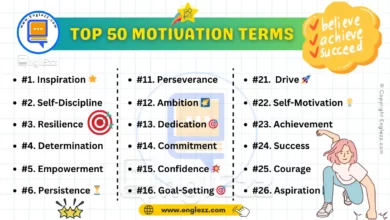
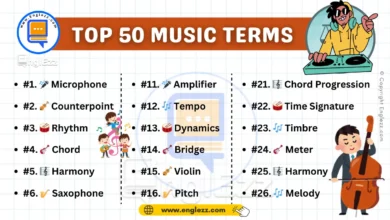



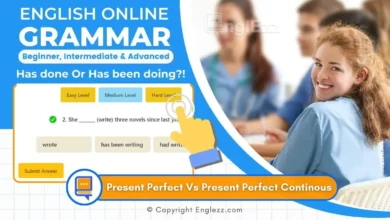
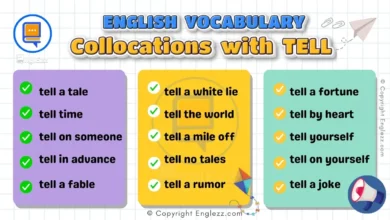
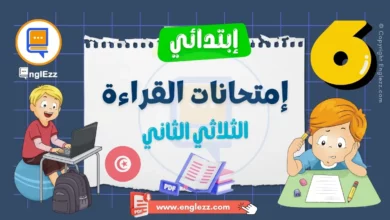
Curious about British civilization and its rich history? Dive into our detailed guide on 50 key aspects of British civilization, complete with concise descriptions. Explore the core elements that have shaped Britain’s identity over centuries. For more engaging content and to stay updated with the latest in language and history, follow and like us @EnglEzz. Check out the post here: ✨
.
https://www.englezz.com/most-common-british-civilisation-terms/
.
#englezz #waystosay #synonyms #britishhistory #culture #education #learnenglish #historicalfacts #languagelearning